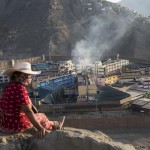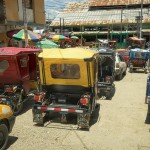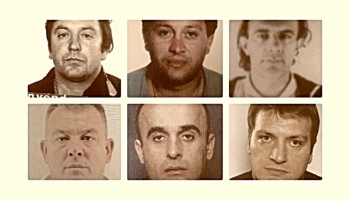Born in Bosnia-Herzegovina in 1960, Mileta Miljanić is the leader of the brutal yet low-profile drug trafficking organization dubbed “Group America,” a network with historic links to the Serbian secret police and suspected ties to the U.S. intelligence community.
Over the past four decades, Miljanić has transformed the Serbian-American narco-syndicate into a highly secretive and effective criminal enterprise, building on their roots in the Western Balkans and long-standing ties with New York’s Irish and Italian mobs to create a truly international organization whose operations have been detected in at least 24 countries.
Having absconded almost seven years ago while serving a prison sentence in Italy, Miljanić was, until recently, living quietly as a free man in New York City.
The FBI arrested him on gun charges in February 2021 during a search of his home, which followed roughly two months after federal prosecutors in court papers linked Miljanic and Group America to a wide-ranging fraud and bribery case involving New York labor leader James Cahill.
What is Group America, and how did Mileta Miljanić become its leader?
Miljanić and his long-standing partner in crime, Zoran Jakšić ― an imposing figure at over six and a half feet tall, with a penchant for classical literature and philosophy ― turned Group America into what it is today. But they weren’t its founders.
The syndicate’s origins date back to the 1970s, when Serbian nationalist Boško “The Yugo” Radonjić emigrated to the United States from what was then Yugoslavia.
Radonjić fell in with The Westies, a largely Irish-American organized crime group based in New York City, and rose through the ranks to eventually become their leader. From there, he formed close ties with the Gambino Italian mafia family, including its longtime leader, John Gotti.
As the historically Irish-American gang evolved under Radonjić’s leadership, Miljanić and Jakšić joined the Serbian crime boss sometime in the 1980s.
Roughly a decade later, many of the gang’s leaders returned to the Balkans amid the dissolution of Yugoslavia, where they allegedly established links with Serbia’s security forces. In the years that followed, the group began trafficking vast quantities of cocaine into Europe from South America — the trade that would come to define Group America’s business empire after Miljanić assumed power.
Gradually, Radonjić stepped back from active leadership of the group. In 1997, the man who had initially assumed oversight of the syndicate’s narcotics activities disappeared, likely assassinated by a rival gang. The organization pursued bloody revenge against the suspected culprits, and it was Miljanić who then emerged as the group’s new chief operator.
The violence didn’t end there.
After Milošević was ousted as Serbia’s president in 2000 and replaced by a reformist government, Group America orchestrated a campaign of domestic terrorism to conserve their business interests.
This partly took shape in the form of a plot to assassinate several politicians in order to create what Serbian prosecutors described as “fear among citizens and an atmosphere of inviolable power.” The terror campaign claimed a victim, senior Serbian police official Boško Buha, in June 2002.
Why has Miljanić been able to live freely in the United States?
In 2014, Miljanić disappeared from under the nose of Italian authorities while on unsupervised parole, thirteen months before completing a seven-year sentence for distributing narcotics.
His home address is a townhouse in the Ridgewood neighborhood of Queens, New York.
Miljanić is no stranger to the inside of a cell, having also served time on drug charges in a Greek prison in the mid-2000s, as well as doing a stint for credit card fraud in the U.S. in the 1980s.
But so far, he’s been able to avoid punishment commensurate with his role as head of an international narco-syndicate.
Jakšić, for instance, has been imprisoned in Peru on drug charges since 2016, and is serving a 25-year sentence.
Exactly how Miljanić, a U.S. citizen, has avoided seriously falling foul of the authorities remains an open question ― but some law enforcement officials in Europe believe the Group America leader is protected by members of the intelligence community.
Radonjić’s links with the Serbian National Security Service in the 1990s are widely known, and OCCRP investigations have revealed that senior police sources in Serbia and Italy suspect Group America also has ties to the U.S. Central Intelligence Agency.
“I believe the CIA stands behind them. That is why we gave them the name Group America,” one official said.
Prosecutors in the U.S. did in fact indict Miljanić and two others on charges of conspiring to distribute narcotics in 2003. While the case is listed on the public docket, it remains sealed, meaning that these proceedings against the Group America leader are still a mystery.
Where does Group America operate?
Historically, what’s made the structure of Miljanić’s syndicate so difficult for investigators to penetrate is the fluidity of its operations. Law enforcement believe that his group may have 15 key players, who in turn coordinate with around 100 trusted associates from several continents and enlist local criminals as necessary.
Criminal actors linked to the group have been arrested and charged in more than nine countries, including Serbia, Montenegro, Germany, Italy, Greece, Poland, South Africa, Argentina, and Peru. South American media have sometimes referred to the group as “el cartel de las Balcanes” — the cartel of the Balkans.
Seizures of drug shipments have pointed to dealings in the U.S., the U.K., Bosnia and Herzegovina, Panama, Australia, Spain, and Switzerland, among others.
Why is Miljanić’s group so successful?
Fluidity of operations is also the hallmark of Miljanić’s success as a drug lord.
Group America isn't known to manufacture their product, or distribute it at street level. Instead, it acts as a middleman specializing in meeting the complex logistical challenges of the international trade in narcotics so that other drug traffickers don’t have to.
Utilizing their considerable network of contacts from around the world, they’ve been remarkably effective at setting up clandestine trafficking routes and responding swiftly when things go wrong.
Miljanić’s operators have a knack for concealing shipments in inventive ways ― whether it’s hiding drugs in hollowed-out deodorant cans, or the glue of asphalt tiles ― but their other methods can be deceptively simple.
Often, the group will entrust smaller, individual shipments to low-level mules who aren’t themselves formally associated with the gang.
Maintaining a degree of distance from their shipments allows higher management to more effectively insulate themselves from the risk of being caught. Smaller batches also decrease the chance of shipments being detected by authorities, as well as mitigating the financial loss if the goods are intercepted.
Where does the money go?
Group America’s investments, much like their drugs, traverse the globe. For seven years, OCCRP and its Serbian member center KRIK tracked the syndicate’s earnings as they’ve poured money into businesses ranging from casinos and strip clubs to beauty studios and taxi companies, and even making donations to churches.
One apparently popular laundering spot for Group America’s cash is Zlatibor, a mountain town in western Serbia that may once have served as a hideout for members during a vicious gang war in the early 2000s.
Miljanić’s wife has had a 56-square-meter mountainside property and summer house there, and founded a company in Zlatibor that now operates two luxury Thai massage spas in Belgrade.
The organization’s ties to the resort hark back to their early days under the leadership of Boško Radonjić, who in 1991 opened a casino at the town’s historic Palisad hotel.
One of the gang’s longstanding associates in Zlatibor is Borivoje Milić, a former Serbian soldier with a reputation for violence. In 2012, he viciously stabbed a tourist from Belgrade following an argument at a local bakery.







